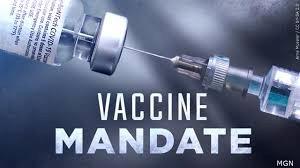On November 5th the Occupational  Safety and Health Administration issued an Emergency Temporary Standard requiring employers with more than a hundred workers to vaccinate against COVID. The OSHA regulation allowed for exemptions on the basis of sincere religious belief or medical exceptions. The day following, the U.S. Court of Appeals for the Fifth Circuit stayed the ETS. The Fifth Circuit then denied a Department of Labor motion to lift the stay and the issue was referred to the Sixth Circuit that undertook to review a consolidated of numerous motions opposing the ETS. At the present time the ETS is suspended until final legal resolution that in all probability will require a ruling from the Supreme Court.
Safety and Health Administration issued an Emergency Temporary Standard requiring employers with more than a hundred workers to vaccinate against COVID. The OSHA regulation allowed for exemptions on the basis of sincere religious belief or medical exceptions. The day following, the U.S. Court of Appeals for the Fifth Circuit stayed the ETS. The Fifth Circuit then denied a Department of Labor motion to lift the stay and the issue was referred to the Sixth Circuit that undertook to review a consolidated of numerous motions opposing the ETS. At the present time the ETS is suspended until final legal resolution that in all probability will require a ruling from the Supreme Court.
EGG-NEWS is not in favor of mandates despite the fact that this newsletter has consistently and will continue to promote vaccination as the most important component of an integrated program of preventing COVID. The value of vaccination is recognized by the intensive livestock industry with most red-meat packers and broiler integrators implementing immunization as soon as vaccine was available. It is a matter of record that leading protein companies including Tyson Foods have achieved higher than 95 percent vaccine compliance applying stick-and-carrot policies ultimately mandating vaccination but with education and financial incentives making vaccination convenient through on-site clinics.

The reason why mandates are considered inappropriate is that they are by intent heavy-handed and regarded as an intrusion into personal liberty representing Government interference in what might be justifiably regarded as an issue between patient and physician. Unfortunately, at an early stage in the emergence of COVID, prevention including masking, social distancing and then vaccination became a political issue whereas the pandemic is in reality a public health situation.
Concern over absenteeism and protest resignations in a tight labor market is accepted as the principal justification for agricultural associations opposing mandates. Recent studies have shown that less than three percent of employers have experienced resignations following mandates including major food producers, medical-care providers and transport companies. The decision by the Administration to introduce a mandate, although based on the need to reduce the incidence rate of the Delta variant was ill advised. In the same way the previous Administration in the early stages of COVID followed a policy of denial to the point of suppressing statistics and placing pressure on the Centers for Disease Control. Both approaches are ethically and practically wrong and ultimately ineffective. It would have been more beneficial for both  Administrations to have adopted realistic, middle-of-the road promotion of vaccination. Simply publicizing scientific data supporting protection against hospitalization and fatalities and offering the prospect of ending the pandemic should have sufficed before the well was poisoned. Positive inducements while recognizing legitimate disinclination to be vaccinated in some areas and among some demographics would have increased the proportion of fully vaccinated U.S. residents above the present 60 percent that is inadequate to achieve herd immunity.
Administrations to have adopted realistic, middle-of-the road promotion of vaccination. Simply publicizing scientific data supporting protection against hospitalization and fatalities and offering the prospect of ending the pandemic should have sufficed before the well was poisoned. Positive inducements while recognizing legitimate disinclination to be vaccinated in some areas and among some demographics would have increased the proportion of fully vaccinated U.S. residents above the present 60 percent that is inadequate to achieve herd immunity.
While awaiting the decision of the Sixth Circuit, there are a number of actions that can be taken by employers in anticipation of either mandated vaccination or an in-company program. These include:-
- Ascertaining the proportion of workers who are vaccinated but maintaining compliance with state and federal regulation concerning confidentiality
- Establish a clearly articulated policy on vaccination that can be issued to all workers in both English and the preferred language of a diverse work force
- Maintain a record of vaccination status of those volunteering information
- Make provision for a suitable level of rapid testing using immuno-based antigen detection kits
- Require any employee who is concerned over possible infection to self-quarantine with pay
- Require employees who are not vaccinated to wear face covering while at an internal workplace or in a company vehicle
- Establish a system to report COVID diagnoses to health authorities and OSHA
- Develop a policy for dealing with employees who are disinclined to be vaccinated
The rate of spread and extent of the Omicron variant has yet to be determined. If the numerous mutations on the spike protein make this strain more infectious than the predominant Delta strain or leads to diminished protection, our Nation will have a problem. Initial evidence suggests that two priming doses of mRNA vaccine followed by a booster will provide protection against the Omicron variant that is more infectious but may be less pathogenic than the Delta strain.
Notwithstanding the proportion of variants of COVID in circulation worldwide, the Delta variant is responsible for the recent increase in cases, hospitalizations and fatalities especially in individuals with predisposing co-morbidities. Setting aside considerations of mandates, litigation, political views and religious sentiment, vaccination as a scientifically valid method of prevention must be encouraged to enable our Nation to return to a pre-COVID economy and way of life.